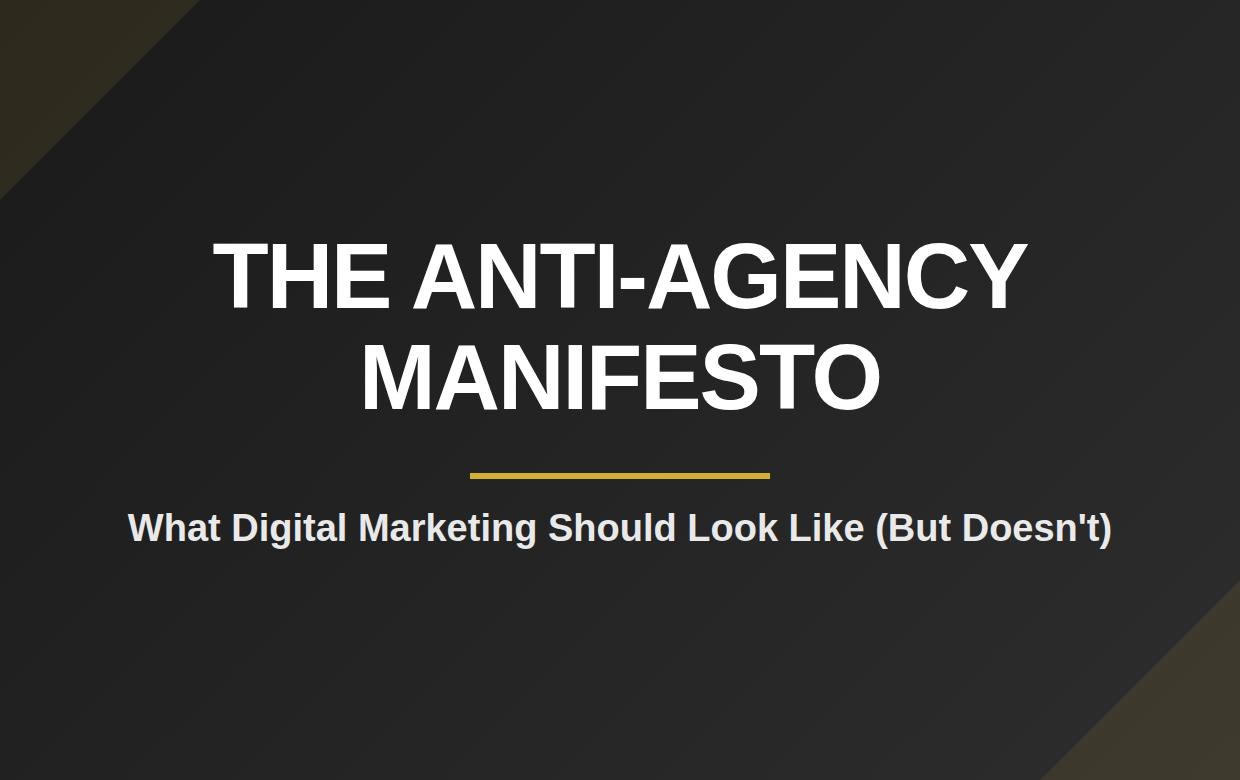I'm going to tell you something most agency owners won't admit.
The digital marketing agency industry is broken. And I should know. I've run one for 10 years.
Last month, I sat across from a restoration company owner who'd just fired his third agency in two years. He was furious. Not the explosive kind of angry. The exhausted kind. The kind that comes from spending $180,000 and having absolutely nothing to show for it except a folder full of pretty reports about "brand awareness" and "engagement rates."
"They kept telling me to trust the process," he said. "Well, I trusted the process. The process didn't pay my bills."
Here's what he didn't know, what most business owners don't know: The process was never designed to pay his bills. It was designed to pay the agency's bills. Big difference.
And I'm done pretending the emperor has clothes.
The Typical Agency Playbook (And Why It Sucks)
Walk into any digital marketing agency pitch, and you'll hear the same song. Different words, same tune.
"We have packages designed for businesses like yours."
Translation: We have a template we use for everyone, and we're going to charge you like it's custom work.
Here's how the traditional agency model actually works, the part they don't put in the proposal:
They sell you a package. Doesn't matter if you're a plumber or a plastic surgeon. Small packages, medium packages, large packages. Like you're ordering a combo meal. "Would you like social media posts with that?"
Junior staff does all the work. That charismatic account executive who sold you? You'll never see them again. Your account gets handed to someone who graduated college last year and is managing 15 other accounts just like yours. Nothing against junior staff, they're learning. But you're paying senior-level prices for junior-level execution.
The reports look impressive. Lots of graphs. Upward trending lines. "Your reach increased 47%!" Cool. How many of those people bought something? Crickets.
They lock you into 12-month contracts. Ever wonder why? It's not because the work takes 12 months to show results. It's because they know you're going to want to leave around month 4 when you realize this isn't working. The contract keeps you trapped and paying.
"Trust the process" becomes their mantra. Ask for actual results, and suddenly it's all about patience. "Digital marketing takes time." Sure it does. But not as much time as they need you to believe.
I know this playbook intimately. Because I used to run it myself.
Why This Model Exists (And It's Not What You Think)
Here's the uncomfortable truth: The traditional agency model isn't broken by accident. It's working exactly as designed.
It's profitable for agencies. Highly profitable. Templates scale. Junior staff are cheap. Long contracts guarantee revenue. Vanity metrics avoid accountability.
It's a beautiful business model. For the agency.
For you? Not so much.
Think about it. If an agency creates a custom strategy for every client, they can't scale easily. If they put senior people on every account, their margins shrink. If they report on actual ROI, they have to be accountable for results. If they go month-to-month, they have to earn your business every single month.
All of that is harder. More expensive. More risky.
So they don't do it.
Instead, they perfect the art of looking busy while being vague about results. They master the language of "brand building" and "long-term strategy" because these concepts are impossible to measure in the short term.
A contractor I worked with last year told me his previous agency ran Facebook ads for eight months. Spent $32,000. When he asked how many jobs came from it, they said, "We don't track that on our end. That's a you thing."
A "you thing."
Your $32,000. Your lack of results. Your problem.
That's the model. And it's everywhere.
The Anti-Agency Alternative
So what should it look like instead?
I'm not talking about incremental improvements. I'm talking about burning the playbook and starting over.
Every strategy is custom-built after deep business discovery. Not a 30-minute kickoff call. Real discovery. I need to understand your business model, your margins, your sales process, your actual bottlenecks. Because a plumber and a plastic surgeon don't have the same business. They shouldn't have the same marketing.
Founder or senior leadership stays involved. Not just in the pitch. Throughout the relationship. The person with actual expertise doesn't disappear after you sign. Because expertise matters. Experience matters. And you're paying for it.
ROI reporting tied to actual business outcomes. Not reach. Not impressions. Not engagement rate. How many leads came in? What was their value? What's the ROI calculation? If I can't connect the marketing spend to business results, I'm doing something wrong.
Month-to-month relationships based on value, not contracts. If the work is valuable, you'll stay. If it's not, you should leave. I shouldn't need a legal document to keep you as a client. The results should do that.
Transparent about what's working and what's not. Some things will fail. That's marketing. But I'm going to tell you what failed, why it failed, and what we're doing differently. No hiding behind jargon or "trust the process."
This isn't revolutionary. It's basic integrity applied to an industry that's forgotten what integrity looks like.
What This Actually Looks Like In Practice
Let me show you the difference with real examples.
Traditional Agency Approach:"We'll post 3x per week on social media. We'll create a content calendar with a mix of educational and promotional content. We'll engage with your followers. Monthly reports will show reach and engagement metrics."
Sounds professional. Also completely meaningless.
Anti-Agency Approach:"We'll create content specifically designed to attract your $50K+ commercial clients. Each post will address a specific objection or pain point these decision-makers have. We'll track which posts generate profile views from target companies, which lead to DMs or consultation requests, and we'll calculate the ROI of each content theme so we can double down on what works."
See the difference? One is activity-based. The other is outcome-based.
Here's another.
Traditional Agency:"Your engagement rate increased 23% this month! Your followers grew by 156. Your top post reached 8,400 people."
Great. And?
Anti-Agency:"Here's how many leads came from our work this month: 34. Their average deal value based on your sales data: $12,500. That's $425,000 in pipeline from a $5,000 marketing spend. ROI: 8,400%. Here's the breakdown by channel so you can see where every dollar went."
One makes you feel good. The other makes you money.
I had a restoration company owner tell me, "This is the first time an agency has told me something didn't work." His Facebook ads weren't converting. I told him straight up: "This isn't working. Here's why I think that is. Here's what we should try instead. If that doesn't work in 30 days, we should probably try something completely different."
He was shocked. Not at the failure. At the honesty.
That's how broken this industry is. Honesty is shocking.
Why More Agencies Don't Do This
You might be wondering: If this approach is better, why doesn't everyone do it?
Simple. It's harder.
Custom work doesn't scale the way templates do. You can't hire a junior coordinator to execute custom strategy. They don't have the experience. You need senior people. Senior people cost more. Your margins shrink.
True accountability is risky. If you promise ROI and don't deliver, clients leave. If you promise "brand awareness," you can never really fail. It's either building or "it takes time."
Month-to-month relationships mean you have to earn the business every month. You can't coast. You can't phone it in. You have to actually deliver value consistently.
And here's the big one: It requires actual expertise.
Anyone can post on social media. Not everyone can diagnose why a business's marketing isn't working, create a custom strategy to fix it, execute that strategy effectively, and then prove the ROI.
That takes years of experience. Pattern recognition. Business acumen. Strategic thinking.
Most agencies don't have that. What they have is a playbook they bought from someone else and a team of 24-year-olds executing it.
Nothing against 24-year-olds. But they're not equipped to consult with a business owner who's been in their industry for 20 years. They don't have the business context. They don't have the scars.
So agencies hide behind process. Behind jargon. Behind long contracts and vague metrics.
Because if they had to actually deliver and prove results month after month, they couldn't.
The Challenge (And It's Not What You Think)
Here's what makes this approach really work or fail: You have to actually care about client success more than your own profit margins.
That sounds obvious. It's not.
Every business decision becomes a test. Do I hire another junior person to scale, or do I stay small and senior-heavy? Do I take on this client even though I'm not sure I can help them, or do I turn down revenue? Do I tell this client their expectations are unrealistic, or do I take their money and let them figure it out later?
These decisions reveal what you actually value.
I've turned down probably $500,000 in revenue in the last two years. Not because I'm noble. Because I wasn't confident I could deliver the results those businesses needed. And I'm not interested in taking money I haven't earned.
That's not common in this industry. The common approach is: Take the money. Figure it out later. If it doesn't work, blame the client for not following through or not giving it enough time.
The anti-agency approach only works if you're willing to put results ahead of revenue. Which means sometimes you make less money. Sometimes you work harder for the same fee because that's what the client needs. Sometimes you fire clients who aren't a fit instead of keeping them on life support for the monthly retainer.
That's the real challenge. Not the tactics. The values.
What This Means For You
If you're reading this and nodding along, you've probably been burned before.
Maybe you've spent tens of thousands on agencies that promised the moon and delivered a pile of social media posts no one saw.
Maybe you're currently trapped in a contract with an agency you want to fire.
Maybe you're just tired of the BS and looking for something different.
Here's what I want you to know: This isn't about me. This isn't a pitch disguised as an article.
This is about what's possible when marketing is done by people who give a damn.
You deserve a partner who treats your business like it matters. Who knows that behind every marketing dollar is a real business with real employees and real bills to pay. Who understands that "engagement rate" doesn't put food on anyone's table.
You deserve someone who will tell you the truth, even when it's uncomfortable. Who will say "this isn't working" instead of hiding behind reports. Who will walk away from your money if they can't deliver value.
That should be the standard. Not the exception.
The agency industry has trained business owners to expect less. To accept vague promises and vanity metrics. To believe that marketing is some mysterious dark art that can't be measured or understood.
It's not. It's math. It's psychology. It's testing and optimization. And it can absolutely be measured and proven.
But only if the people doing it want to measure and prove it.
The Conversation You Haven't Had Yet
I don't know if we should work together. I don't even know if this approach is right for your business.
But I do know this: If you're tired of the traditional agency experience, if you want marketing that's accountable and transparent, if you want a partner instead of a vendor, that conversation is worth having.
Not the typical agency pitch where someone talks at you for 45 minutes about their process and their packages and their impressive client roster.
A real conversation. About your business. Your challenges. Your goals. Whether this approach even makes sense for where you are right now.
Because here's the thing about the anti-agency model: It's not for everyone.
If you want someone to just execute tasks, the traditional model is fine. If you're looking for the cheapest option, you can find that elsewhere. If you want to feel good about your engagement rate regardless of business results, there are plenty of agencies that specialize in that.
But if you want a partner who's going to treat your marketing budget like it's their own money, who's going to tell you what you need to hear instead of what you want to hear, who's going to measure success by your business results instead of their own convenience, then maybe we should talk.
No obligation. No pitch. Just a conversation about what's actually possible when marketing is built on integrity instead of industry standards.
Because the industry standard is broken. And it's time we all stopped pretending otherwise.
SML



.png)
